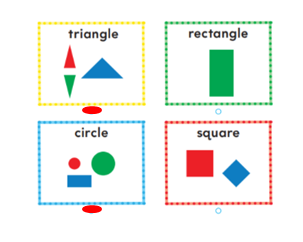Students of Grade K can get a strong foundation on mathematics concepts by referring to the Go Math Grade K Chapter 12 Answer Key Classify and Sort Data. It was developed by highly professional mathematics educators and the solutions prepared by them are in a concise manner for easy grasping.
Go Math Grade K Chapter 12 Answer Key 12 Classify and Sort Data
To achieve high score s in Grade K, students need to solve all questions and exercises included in Go Math Grade K. So, teachers and students can find this Go Math Answer Key for Grade K more helpful in raising students’ scores and supporting teachers to educate the students. With the help of Go Math Primary School Grade K Answer Key, you can think deeply regarding what you are learning, and you will really learn math easily just like that.
Classify and Sort Data Show What You Know
DIRECTIONS 1. Circle the fruits that are red. 2. Circle the triangles. 3. Count and write how many in each set. Circle the set with more objects. 4. Count and write how many in each set. Circle the set with fewer objects.
Color and Shape
Question 1.

Answer:
The number of fruits that are in red color = 4.
Explanation:
In the above-given figure,
given that,
the fruits are apple, watermelon, pineapple, orange, cherries, banana, strawberry.
out of all, there are 4 fruits in red color.
The number of fruits that are in red color = 4.
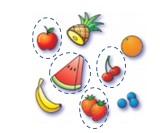
Question 2.

Answer:
The number of Triangles = 2.
Explanation:
In the above-given figure,
given that,
Circle the triangles.
the number of triangles = 2.
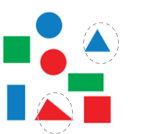
Compare Sets
Question 3.

Answer:
The number of butterflies = 6.
Explanation:
In the above-given figure,
given that,
There are 6 butterflies.
the number of butterflies = 6.

Question 4.

Answer:
The number of butterflies = 6.
Explanation:
In the above-given figure,
given that,
There are 6 butterflies.
the number of butterflies = 6.
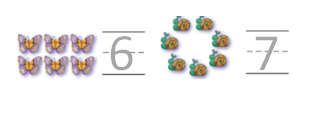
Answer:
The number of shells = 7.
Explanation:
In the above-given figure,
given that,
There are 7 shells.
the number of shells = 7.
Question 5.

Answer:
The number of bees = 8.
Explanation:
In the above-given figure,
given that,
There are 8 bees.
the number of bees = 8.
Answer:
The number of flowers = 9.
Explanation:
In the above-given figure,
given that,
There are 9 flowers.
the number of flowers = 9.
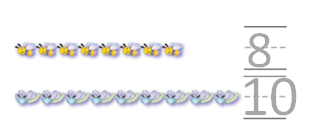
Classify and Sort Data Vocabulary Builder
DIRECTIONS Tell what you know about the ladybugs. Some of the ladybugs are different. Circle those ladybugs and tell why they are different. Tell what you know about the butterflies.

Answer:
The number of butterflies = 5.
The butterflies are in a different colors.
Explanation:
In the above-given figure,
given that,
There are 5 butterflies.
the number of butterflies = 5.
Answer:
The number of ladybugs = 8.
Some ladybugs are dancing and some of them are blowing mike.
Explanation:
In the above-given figure,
given that,
There are 8 ladybugs.
the number of ladybugs = 8.
Classify and Sort Data Game At the Farm
DIRECTIONS Use the picture to play I Spy with a partner. Decide who will go first. Player 1 looks at the picture, selects an object, and tells Player 2 the color of the object. Player 2 must guess what Player 1 sees. Once Player 2 guesses correctly, it is his or her turn to choose an object and have Player 1 guess.

Answer:
The number of ducks = 4.
Explanation:
In the above-given figure,
given that,
There are 4 ducks.
the number of ducks = 4.
Answer:
The number of baskets = 3.
Explanation:
In the above-given figure,
given that,
There are 3 baskets.
the number of baskets = 3.
Classify and Sort Data Vocabulary Game
Guess the Word
DIRECTIONS Players take turns. A player chooses a secret word from the Word Box and then sets the timer. The player gives hints about the secret word. If the other player guesses the secret word before time runs out, he or she puts a connecting cube in the chart. The first player who has connecting cubes in all his or her boxes is the winner.
MATERIALS timer, connecting cubes for each player

The Write Way
DIRECTIONS Choose one idea.
- Draw to show how to classify objects by size.
- Draw to show a graph. Reflect Be ready to tell about your drawing.
Lesson 12.1 Algebra • Classify and Count by Color
Essential Question How can you classify and count objects by color?
Listen and Draw
DIRECTIONS Choose a color. Use that color crayon to color the clouds. Sort and classify a handful of shapes into a set of that color and a set of not that color. Draw and color the shapes.

Answer:
The color of the cloud is the blue color.
The color of the heart symbol is red color.
Explanation:
In the above-given question,
given that,
the color of the cloud is blue color.
The color of the heart symbol is red color.
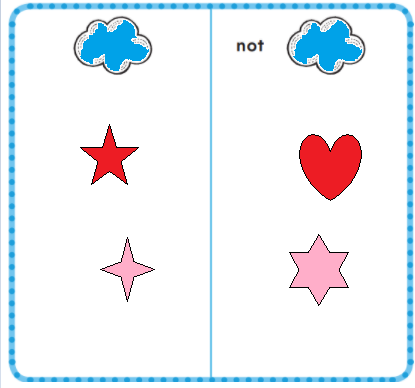
Share and Show
Question 1.
DIRECTIONS 1. Place shapes as shown. Sort and classify the shapes by the category of color. Draw and color the shapes in each category.

Answer:
The number of shapes that are in red color = 3.
The number of shapes that are in blue color = 2.
The number of shapes that are in yellow color = 1.
The number of shapes that are in green color = 1.
Explanation:
In the above-given question,
given that,
the shapes are red, blue, yellow, and green.
the shapes are circle, triangle, square, and rectangle.
The number of shapes that are in red color = 3.
The number of shapes that are in blue color = 2.
The number of shapes that are in yellow color = 1.
The number of shapes that are in green color = 1.
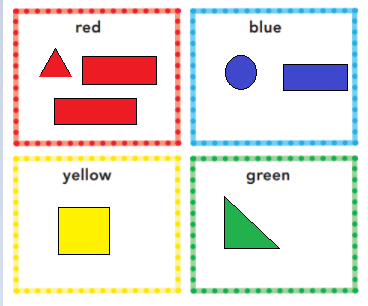
DIRECTIONS Look at the categories of color in Exercise 1. Count how many in each category. 2. Circle the categories of color that have one shape. Write the number. 3. Circle the category that has two shapes. Write the number. 4. Circle the category that has three shapes. Write the number.
Question 2.

Answer:
The number of shapes that are in red color = 3.
The number of shapes that are in blue color = 2.
The number of shapes that are in yellow color = 1.
The number of shapes that are in green color = 1.
Explanation:
In the above-given question,
given that,
the shapes are red, blue, yellow, and green.
the shapes are circle, triangle, square, and rectangle.
The number of shapes that are in red color = 3.
The number of shapes that are in blue color = 2.
The number of shapes that are in yellow color = 1.
The number of shapes that are in green color = 1.
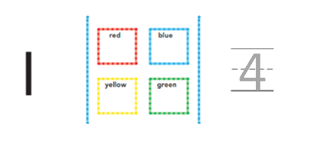
Question 3.

Answer:
The number of shapes that are in red color = 3.
The number of shapes that are in blue color = 2.
The number of shapes that are in yellow color = 1.
The number of shapes that are in green color = 1.
Explanation:
In the above-given question,
given that,
the shapes are red, blue, yellow, and green.
the shapes are circle, triangle, square, and rectangle.
The number of shapes that are in red color = 3.
The number of shapes that are in blue color = 2.
The number of shapes that are in yellow color = 1.
The number of shapes that are in green color = 1.
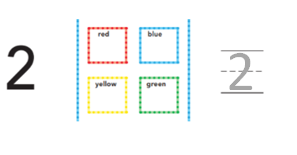
Question 4.

Answer:
The number of shapes that are in red color = 3.
The number of shapes that are in blue color = 2.
The number of shapes that are in yellow color = 1.
The number of shapes that are in green color = 1.
Explanation:
In the above-given question,
given that,
the shapes are red, blue, yellow, and green.
the shapes are circle, triangle, square, and rectangle.
The number of shapes that are in red color = 3.
The number of shapes that are in blue color = 2.
The number of shapes that are in yellow color = 1.
The number of shapes that are in green color = 1.
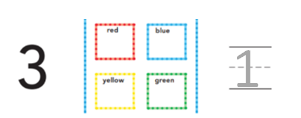
Problem Solving • Applications
DIRECTIONS 5. Ava placed her shapes as shown. How did she sort and classify her shapes? Draw one more shape in each category. 6. Draw to show what you know about sorting and classifying by color.
Question 5.

Answer:
The number of shapes in the 1st category = 6.
The number of shapes in the 2nd category = 6.
Explanation:
In the above-given question,
given that,
the shapes are
rectangle, triangle, square, circle.
The number of shapes in the 1st category = 6.
The number of shapes in the 2nd category = 6.
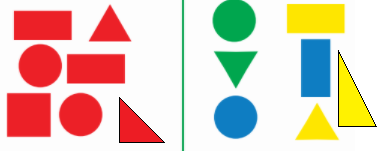
Question 6.
Answer:
Sorting = Arrange systematically in groups and separating according to type.
Explanation:
In the above-given question,
given that,
draw the shapes and sort it.
Sorting = Arrange systematically in groups and separating according to type.
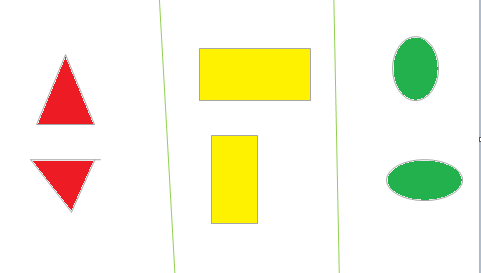
HOME ACTIVITY • Provide your child with different colors of the same objects, such as straws, socks, or toys. Ask him or her to sort and classify the objects into two sets, a set of all one color and a set of all the other colors.
Algebra • Classify and Count by Color Homework & Practice 12.1
DIRECTIONS 1. Place a yellow square, red triangle, red rectangle, yellow square, and red triangle at the top of the page as shown. Sort and classify the shapes by the category of color. Draw and color the shapes in each category. 2. Look at the categories in Exercise 1. Count how many in each category. Circle the category that has 3 shapes. Write the number.
Question 1.

Answer:
The number of squares = 2.
The number of rectangle = 1.
the number of triangles = 2.
Explanation:
In the above-given question,
given that,
the yellow square, red rectangle, red triangle, yellow square, and red triangle.
Sort and classify the shapes by category.
The number of squares = 2.
The number of rectangle = 1.
the number of triangles = 2.
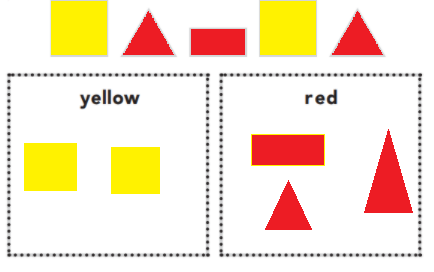
Question 2.

Answer:
The shape that has red color = 3.
Explanation:
In the above-given question,
given that,
the number of shapes that are in red color = 3.
The shape that has red color = 3.
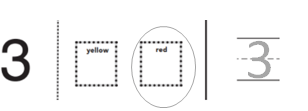
DIRECTIONS 1. Look at the set of shapes. Which shape belongs in the same category? Draw that shape in the box and color it. How many shapes are in the category now? Write the number. 2. Which shape does not stack? Mark an X on the shape. 3. Count and tell how many pieces of fruit. Write the number.
Lesson Check
Question 1.

Answer:
The number of triangles = 4.
Explanation:
In the above-given figure,
given that,
There are 4 triangles.
the number of triangles = 4.
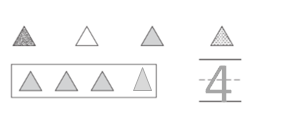
Spiral Review
Question 2.

Answer:
The shape does not stack = sphere.
Explanation:
In the above-given question,
given that,
the shapes are prism, cylinder, sphere, and cylinder.
The shape does not stack = sphere.
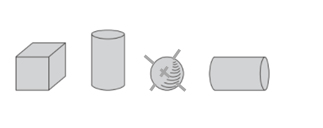
Question 3.

Answer:
The number of fruits = 20.
Explanation:
In the above-given question,
given that,
There are 20 fruits.
The number of fruits = 20.

Lesson 12.2 Algebra • Classify and Count by Shape
Essential Question How can you classify and count objects by shape?
Listen and Draw
DIRECTIONS Choose a shape. Draw the shape at the top of each side. Sort and classify a handful of shapes into a set of the shape you chose and a set that is not that shape. Draw and color the shapes.

Answer:
0.93.
Explanation:
In the above-given question,
given that,
the numbers are (3/10), (41/100), and (22/100).
(3/10) = 0.3.
(41/100) = 0.41.
(22/100) = 0.22.
0.3 + 0.41 + 0.22 = 0.93.
Share and Show
DIRECTIONS 1. Place shapes as shown. Sort and classify the shapes by the category of shape. Draw and color the shapes in each category.
Question 1.

Answer:
The number of circles = 1.
Explanation:
In the above-given figure,
given that,
There is 1 circle.
the number of circles = 1.
Answer:
The number of squares = 1.
Explanation:
In the above-given figure,
given that,
There is 1 square.
the number of squares = 1.
Answer:
The number of triangles = 2.
Explanation:
In the above-given figure,
given that,
There are 2 triangles.
the number of triangles = 2.
Answer:
The number of rectangles = 3.
Explanation:
In the above-given figure,
given that,
There are 3 rectangles.
the number of rectangles = 3.
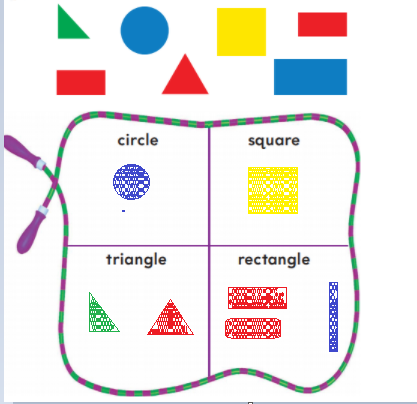
DIRECTIONS Look at the categories of shapes in Exercise 1. Count how many in each category. 2. Circle the categories of shapes that have one shape. Write the number. 3. Circle the category that has two shapes. Write the number. 4. Circle the category that has three shapes. Write the number.
Question 2.

Answer:
The number of circles = 1.
Explanation:
In the above-given figure,
given that,
There is 1 circle.
the number of circles = 1.
Answer:
The number of squares = 1.
Explanation:
In the above-given figure,
given that,
There is 1 square.
the number of squares = 1.
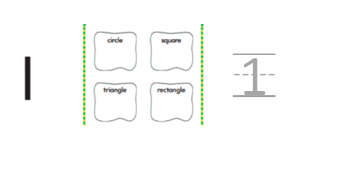
Question 3.

Answer:
The number of triangles = 2.
Explanation:
In the above-given figure,
given that,
There are 2 triangles.
the number of triangles = 2.
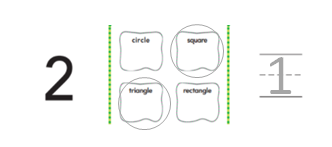
Question 4.

Answer:
The number of rectangles = 3.
Explanation:
In the above-given figure,
given that,
There are 3 rectangles.
the number of rectangles = 3.
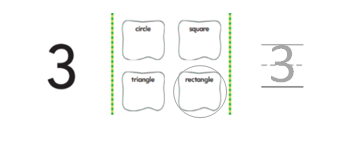
Problem Solving • Applications
DIRECTIONS 5. Brandon used his shapes. How did he sort and classify his shapes? Draw one more shape in each category. 6. Using the same shapes, draw to show what you know about sorting and classifying by shape in a different way.
Question 5.

Answer:
The number of squares = 3.
Explanation:
In the above-given figure,
given that,
There are 3 squares.
the number of squares = 3.
Answer:
The number of rhombus = 2.
Explanation:
In the above-given figure,
given that,
There are 2 rhombus.
the number of rhombus = 2.
Answer:
The number of circles = 1.
Explanation:
In the above-given figure,
given that,
There is 1 circle.
the number of circles = 1.
Answer:
The number of triangles = 2.
Explanation:
In the above-given figure,
given that,
There are 2 triangles.
the number of triangles = 2.
Answer:
The number of rectangles = 3.
Explanation:
In the above-given figure,
given that,
There are 3 rectangles.
the number of rectangles = 3.
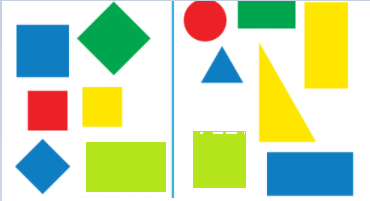
Question 6.
Answer:
Sorting = Distinguish between necessary and unnecessary items and eliminate the unnecessary items.
Explanation:
In the above-given question,
given that,
the meaning of sorting is
Distinguish between necessary and unnecessary items and eliminate the unnecessary items.

HOME ACTIVITY • Have your child sort objects in a house into categories of shape.
Algebra • Classify and Count by Shape Homework & Practice 12.2
DIRECTIONS 1. Place a green triangle, blue circle, red triangle, and blue circle at the top of the page as shown. Sort and classify the shapes by the category of shape. Draw and color the shapes in each category. 2. Look at the categories in Exercise 1. Count how many in each category. Circle the categories that have two shapes. Write the number.
Question 1.

Answer:
The number of circles = 2.
the number of triangles = 2.
Explanation:
In the above-given question,
given that,
green triangle, blue circle, red triangle, and blue circle.
Sort and classify the shapes by category.
The number of squares = 2.
The number of rectangle = 1.
the number of triangles = 2.
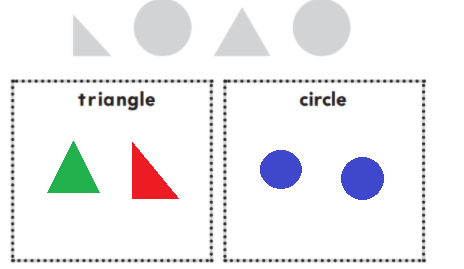
Question 2.

Answer:
The number of triangles = 2.
The number of circles = 2.
Explanation:
In the above-given question,
given that,
the shapes of triangles and circles.
the number of triangles = 2.
the number of circles = 2.
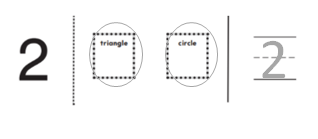
DIRECTIONS 1. Look at the set of shapes. Which shape belongs in the same category? Draw that shape in the oval. How many shapes are in the category now? Write the number. 2. Find two crayons. Place one end of each crayon on the line. Compare the lengths. Draw the crayons. Say longer than, shorter than, or about the same length to describe the lengths. Circle the longer crayon. 3. Complete the addition sentence to show the numbers that match the cube train.
Lesson Check
Question 1.

Answer:
The number of triangles = 4.
Explanation:
In the above-given figure,
given that,
There are 4 triangles.
the number of triangles = 4.
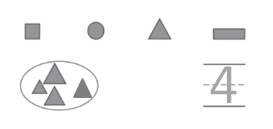
Spiral Review
Question 2.

Answer:
The length of the 1st crayon = 4 cm.
The length of the 2nd crayon = 2 cm.
Explanation:
In the above-given question,
given that,
there are 2 crayons.
the 1st crayon is longer than the 2nd crayon.
The length of the 1st crayon = 4 cm.
The length of the 2nd crayon = 2 cm.
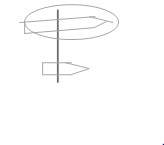
Question 3.

Answer:
The number is 5.
Explanation:
In the above-given question,
given that,
the number is 5.
5 = 1 + 4.
so the number is 5.
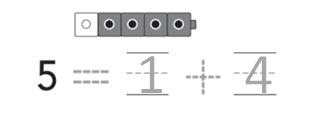
Lesson 12.3 Algebra • Classify and Count by Size
Essential Question How can you classify and count objects by size?
Listen and Draw
DIRECTIONS Sort and classify a handful of shapes by size. Draw and color the shapes.

Answer:
The objects which are in short length = small objects.
The objects which are in long length = large objects.
Explanation:
In the above-given question,
given that,
the number of objects is short and large.
The objects which are in short length = small objects.
The objects which are in long length = large objects.
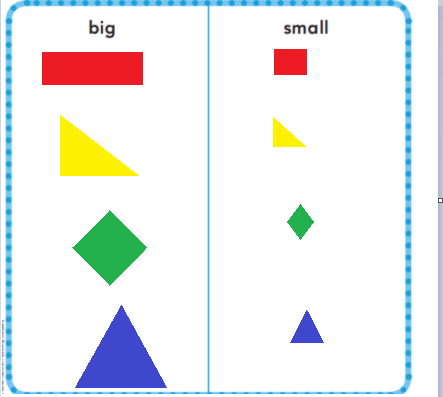
Share and Show
DIRECTIONS 1. Place shapes as shown. Sort and classify the shapes by the category of size. Draw and color the shapes in each category.
Question 1.

Answer:
The number of triangles = 2.
The number of rectangles = 3.
The number of squares = 1.
The number of circles = 1.
Explanation:
In the above-given question,
given that,
the shapes are triangle, rectangle, squares, and circle.
The number of triangles = 2.
The number of rectangles = 3.
The number of squares = 1.
The number of circles = 1.
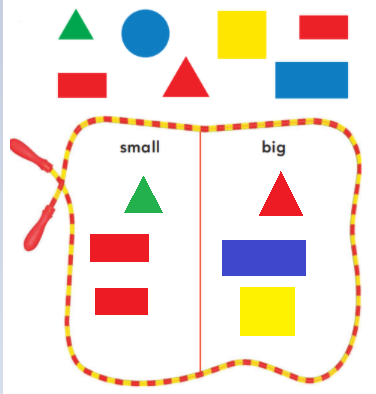
DIRECTIONS Look at the categories of size in Exercise 1. Count how many in each category. 2. Circle the category that has three per category. Write the number. 3. Circle the category that has four per category. Write the number.
Question 2.

Answer:
The number of rectangles = 3.
Explanation:
In the above-given figure,
given that,
There is 1 small and 2 big rectangles.
the number of rectangles = 3.
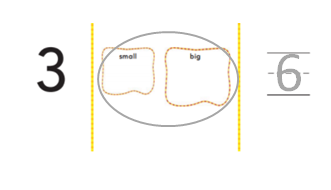
Question 3.

Answer:
The number of rectangles = 3.
Explanation:
In the above-given figure,
given that,
There is 1 small and 2 big rectangles.
the number of rectangles = 3.
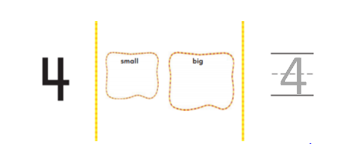
Algebra • Classify and Count by Size Homework & Practice 12.3
DIRECTIONS 1. Place a yellow square, blue circle, red rectangle, and blue rectangle at the top of the page as shown. Sort and classify the shapes by the category of size. Draw and color the shapes in each category. 2. Look at the categories in Exercise 1. Count how many in each category. Circle the category that has one per category. Write the number.
Question 1.

Answer:
The number of circles = 1.
the number of rectangles = 2.
the number of squares = 1.
Explanation:
In the above-given question,
given that,
yellow square, blue circle, red rectangle, and blue rectangle.
Sort and classify the shapes by category.
The number of squares = 1.
The number of rectangle = 2.
the number of circles = 1.
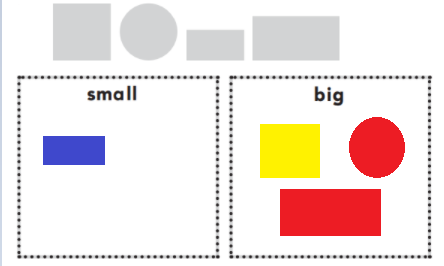
Question 2.

Answer:
The number of rectangle = 1.
Explanation:
In the above-given question,
given that,
The number of small rectangles = 1.
The number of rectangle = 1.
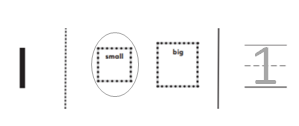
DIRECTIONS 1. Sort and classify the shapes by the category of size. Draw the shapes in each category. 2. How many flat surfaces does the cylinder have? Write the number. 3. Sarah makes a five-cube train. She takes the cube train apart to show how many cubes are gray. Trace and write to show the subtraction sentence for Sarah’s cube train.
Lesson Check
Question 1.

Answer:
The number of small objects = 3.
The number of big objects = 1.
Explanation:
In the above-given question,
given that,
the shapes are circle, square, rectangle, and triangle.
The number of small objects = 3.
The number of big objects = 1.
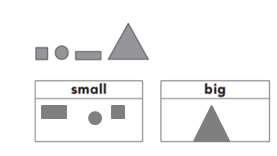
Spiral Review
Question 2.

Answer:
The number of flat surfaces = 2.
Explanation:
In the above-given question,
given that,
The number of flat surfaces = 2
there are 2 flat surfaces for the cylinder.
the number of flat surfaces = 2.
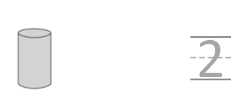
Question 3.

Answer:
The number is 3.
Explanation:
In the above-given question,
given that,
the number is 5.
5 – 2 = 3.
The number is 3.
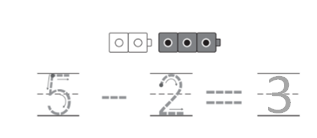
Classify and Sort Data Mid-Chapter Checkpoint
Concepts and Skills
DIRECTIONS 1. Look at the set at the beginning of the row. Circle the shape that belongs in that set. (K.MD.B.3) 2. Look at the shape at the beginning of the row. Mark an X on the set in which the shape belongs. (K.MD.B.3) 3. Draw lines to match the shapes to the category.
Question 1.

Answer:
The shape of the circle = yellow.
Explanation:
In the above-given question,
given that,
The shapes are blue, green, and yellow.
the yellow color matches the 1st category.
The shapes of the circle = yellow.

Question 2.

Answer:
The Triangle belongs to the 2nd category.
Explanation:
In the above-given question,
given that,
The shape is a triangle,
the triangle belongs to the 2nd category.
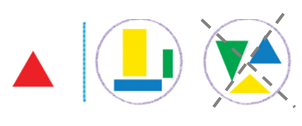
Question 3.
THINK SMARTER

Answer:
The circle, square, and triangle in green color.
The triangles are big.
The circle, square, and triangle are small.
Explanation:
In the above-given question,
given that,
the shapes are triangles.
The circle, square, and triangle in green color.
The triangles are big.
The circle, square, and triangle are small.
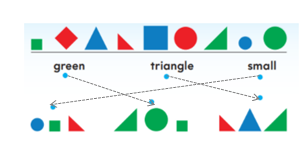
Lesson 12.4 Make a Concrete Graph
Essential Question How can you make a graph to count objects that have been classified into categories?
Listen and Draw
DIRECTIONS Place a handful of orange and green cubes on the workspace. Sort and classify the cubes by the category of color. Move the cubes to the graph by category. Draw and color the cubes. Tell a friend how many in each category.

Answer:
The number of orange cubes = 4.
The number of green cubes = 3.
Explanation:
In the above-given question,
given that,
There are 4 orange and 3 green cubes.
The number of orange cubes = 4.
The number of green cubes = 3.
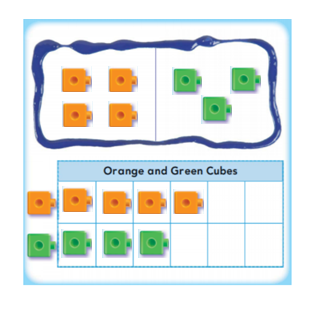
Share and Show
DIRECTIONS 1. Place a handful of red and blue cubes on the workspace. Sort and classify the cubes by category. 2. Move the cubes to the graph. Draw and color the cubes. 3. Write how many of each cube.
Question 1.

Answer:
The number of cubes = 5.
the number of green cubes = 3.
the number of orange cubes = 2.
Explanation:
In the above-given question,
given that,
the number of cubes = 5.
the number of green cubes = 3.
the number of orange cubes = 2.
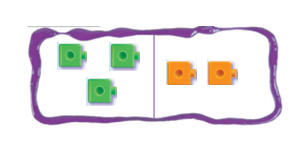
Question 2.

Answer:
The number of red cubes = 4.
The number of blue cubes = 3.
Explanation:
In the above-given question,
given that,
The number of red cubes = 4.
The number of blue cubes = 3.
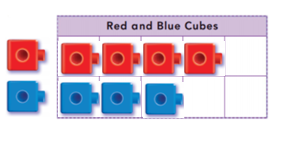
Question 3.

Answer:
The number of red cubes = 4.
The number of blue cubes = 3.
Explanation:
In the above-given question,
given that,
The number of red cubes = 4.
The number of blue cubes = 3.

DIRECTIONS 4. Place a handful of green circles and triangles on the workspace. Sort and classify the shapes by category. 5. Move the shapes to the graph. Draw and color the shapes. 6. Write how many of each shape.
Question 4.

Answer:
the number of green circles = 3.
the number of green triangles = 2.
Explanation:
In the above-given question,
given that,
the number of circles and triangles.
the number of green circles = 3.
the number of green triangles = 2.
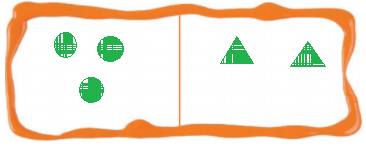
Question 5.

Answer:
the number of green circles = 3.
the number of green triangles = 2.
Explanation:
In the above-given question,
given that,
the number of circles and triangles.
the number of green circles = 3.
the number of green triangles = 2.
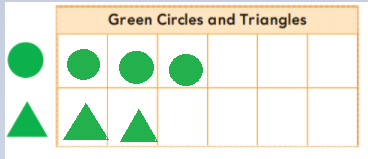
Question 6.

Answer:
the number of green circles = 3.
the number of green triangles = 2.
Explanation:
In the above-given question,
given that,
the number of circles and triangles.
the number of green circles = 3.
the number of green triangles = 2.

Problem Solving • Applications
DIRECTIONS 7. Use five cubes of two colors. Color the cubes to show the categories. Draw and color to show what you know about making a graph with those cubes. How many are in each category? Write the numbers.
Question 7.

Answer:
The number of green cubes = 3.
the number of orange cubes = 2.
Explanation:
In the above-given question,
given that,
the number of cubes = 5.
the number of green cubes = 3.
the number of orange cubes = 2.
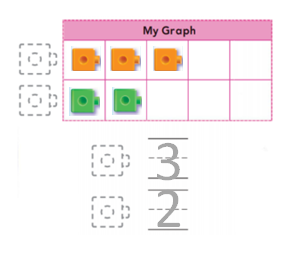
HOME ACTIVITY • Have your child tell about the graph that he or she made on this page.
Make a Concrete Graph Homework & Practice 12.4
DIRECTIONS 1. Place a handful of green circles and triangles on the workspace. Sort and classify the shapes by category. 2. Move the shapes to the graph. Draw and color the shapes. 3. Write how many of each shape.
Question 1.

Answer:
the number of green circles = 3.
the number of green triangles = 2.
Explanation:
In the above-given question,
given that,
the number of circles and triangles.
the number of green circles = 3.
the number of green triangles = 2.

Question 2.

Answer:
the number of green circles = 3.
the number of green triangles = 2.
Explanation:
In the above-given question,
given that,
the number of circles and triangles.
the number of green circles = 3.
the number of green triangles = 2.

Question 3.

Answer:
the number of green circles = 3.
the number of green triangles = 2.
Explanation:
In the above-given question,
given that,
the number of circles and triangles.
the number of green circles = 3.
the number of green triangles = 2.
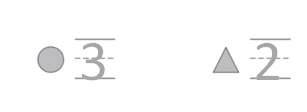
DIRECTIONS 1. Look at the shapes. Draw and color the shapes in the graph. Write how many of each shape. 2. Make a cube train that is about the same height as the cube train shown. Draw and color the cube train. 3. How many tiles are there? Write the number.
Lesson Check
Question 1.

Answer:
The number of triangles = 5.
The number of squares = 2.
Explanation:
In the above-given question,
given that,
The shapes are triangles, and squares.
The number of triangles = 5.
The number of squares = 2.
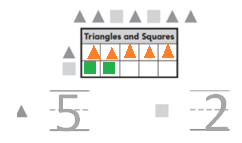
Spiral Review
Question 2.

Answer:
The number of cubes = 3.
Explanation:
In the above-given question,
given that,
the number of cubes = 3.
cube train = 1.
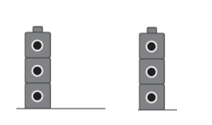
Question 3.

Answer:
The number of tiles = 14.
Explanation:
In the above-given question,
given that,
there are 14 tiles.
the number of tiles = 14.
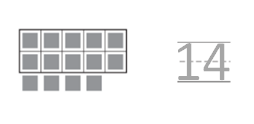
Lesson 12.5 Problem Solving • Read a Graph
Essential Question How can you read a graph to count objects that have been classified into categories?
Try Another Problem
DIRECTIONS 1. Billy made a graph showing his counters. Color the counters to show his categories. How many counters are in each category? Write the numbers. 2. Circle the category that has more counters on the graph.

Question 1.

Answer:
The number of yellow counter = 5.
The number of red counters = 4.
Explanation:
In the above-given question,
given that,
there are yellow and red counters.
The number of yellow counter = 5.
The number of red counters = 4.

Question 2.

Answer:
The number of yellow counter = 5.
The number of red counters = 4.
Explanation:
In the above-given question,
given that,
there are yellow and red counters.
The number of yellow counter = 5.
The number of red counters = 4.

Share and Show
DIRECTIONS 3. Rong made a graph of her counters. Color the counters to show her categories. How many counters are in each category? Write the numbers. 4. Circle the category that has fewer counters on the graph.

Question 3.

Answer:
The number of yellow counter = 4.
The number of red counters = 3.
Explanation:
In the above-given question,
given that,
there are yellow and red counters.
The number of yellow counter = 4.
The number of red counters = 3.

Question 4.

Answer:
The number of yellow counter = 4.
The number of red counters = 3.
Explanation:
In the above-given question,
given that,
there are yellow and red counters.
The number of yellow counter = 4.
The number of red counters = 3.

On Your Own
DIRECTIONS 5. Brian has more blue cubes than red cubes. Draw and color to show his cubes on the graph. Count how many in each category. Write the numbers.
Question 5.

Answer:
The number of red cubes = 3.
The number of blue cubes = 4.
Explanation:
In the above-given question,
given that,
The number of red cubes = 3.
The number of blue cubes = 4.
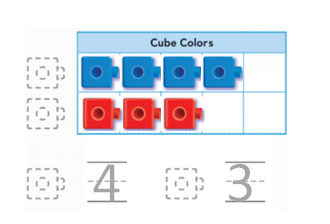
HOME ACTIVITY • Have your child tell about the graph he or she made on this page. Ask him or her which category has more cubes and which category has fewer cubes.
Problem Solving • Read a Graph Homework & Practice 12.5
DIRECTIONS 1. Color the counters to show the categories. R is for red, and Y is for yellow. How many counters are in each category? Write the numbers. 2. Circle the category that has more counters on the graph.

Question 1.

Answer:
The number of yellow counter = 3.
The number of red counters = 4.
Explanation:
In the above-given question,
given that,
there are yellow and red counters.
The number of yellow counter = 3.
The number of red counters = 4.
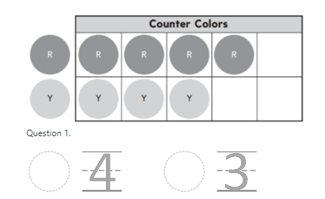
Question 2.

Answer:
The number of yellow counter = 3.
The number of red counters = 4.
Explanation:
In the above-given question,
given that,
there are yellow and red counters.
The number of yellow counter = 3.
The number of red counters = 4.

DIRECTIONS 1. How many counters are in each category? Write the numbers. Circle the category that has more counters. 2. Complete the addition sentence to show the numbers that match the cube train. 3. Make a cube train that is about the same length as the cube train shown. Draw and color the cube train.
Lesson Check
Question 1.

Answer:
The number of yellow counter = 5.
The number of red counters = 3.
Explanation:
In the above-given question,
given that,
there are yellow and red counters.
The number of yellow counter = 5.
The number of red counters = 3.
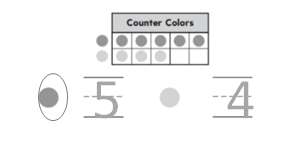
Spiral Review
Question 2.

Answer:
The number of cubes = 8.
Explanation:
In the above-given question,
given that,
the number of cubes = 8.
3 + 5 = 8.
cube train = 1.
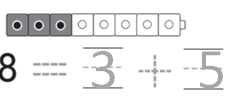
Question 3.

Answer:
The number of cubes = 8.
Explanation:
In the above-given question,
given that,
the number of cubes = 8.
3 + 5 = 8.
cube train = 1.
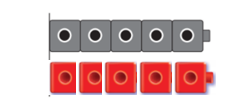
Classify and Sort Data Review/Test
DIRECTIONS 1. Lin sorted some shapes into categories by color. Look at the shape at the beginning of the row. Mark an X on the category that shows where the shape belongs. 2. Draw and color a shape that belongs in this category. 3. Look at the shape at the beginning of the row. Mark under all of the categories the shape can belong.
Question 1.

Answer:
The number of circles = 1.
Explanation:
In the above-given question,
given that,
The number of circles = 1.
The number of circles = 1.
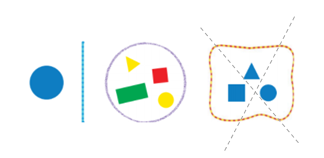
Question 2.

Answer:
The number of circles = 2.
The number of triangles = 2.
The number of square = 1.
The number of rhombus = 1.
Explanation:
In the above-given question,
given that,
the shapes are circle, triangle, square, and rhombus.
The number of circles = 2.
The number of triangles = 2.
The number of square = 1.
The number of rhombus = 1.
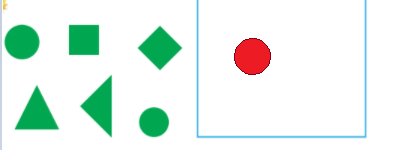
Question 3.

Answer:
The number of circles = 2.
The number of triangles = 2.
The number of square = 1.
The number of rhombus = 1.
Explanation:
In the above-given question,
given that,
the shapes are circle, triangle, square, and rhombus.
The number of circles = 2.
The number of triangles = 2.
The number of square = 1.
The number of rhombus = 1.
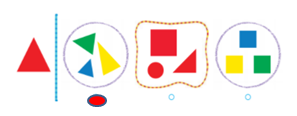
DIRECTIONS 4. Draw and color a shape that belongs in this category. 5. Mark an X on each big shape. Write how many big objects. Draw a circle around each of the small objects. Write how many small objects. 6. Draw lines to match the shapes to the way they were sorted.
Question 4.

Answer:
The number of rectangles.
Explanation:
In the above-given question,
given that,
There are squares and rectangles.
The number of rectangles.
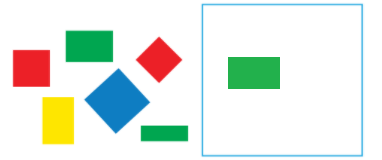
Question 5.
THINK SMARTER+

Answer:
The number of big objects = 2.
The number of small objects = 4.
Explanation:
In the above-given question,
given that,
the big objects and small objects.
The number of big objects = 2.
The number of small objects = 4.
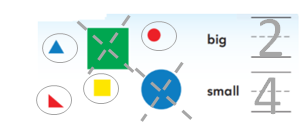
Question 6.

Answer:
The big objects are square, triangle, and circe.
the small objects are square, circle, and triangle.
Explanation:
In the above-given question,
given that,
the shapes are square, triangle, and circle.
The big objects are square, triangle, and circe.
the small objects are square, circle, and triangle.
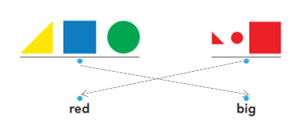
DIRECTIONS 7. Sort and classify the shapes by category. Draw each shape on the graph. Write how many of each shape. 8. Jake sorted some shapes. Then he made a graph. Count how many shapes there are in each category. Mark an X on the category that has more shapes.
Question 7.
THINK SMARTER+

Answer:
the number of circles = 3.
the number of triangles = 2.
Explanation:
In the above-given question,
given that,
the number of circles and triangles.
the number of circles = 3.
the number of triangles = 2.
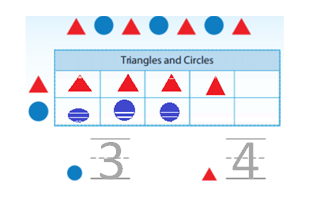
Question 8.

Answer:
The number of squares = 2.
The number of circles = 3.
Explanation:
In the above-given question,
given that,
the shapes are square and circles.
The number of squares = 2.
The number of circles = 3.
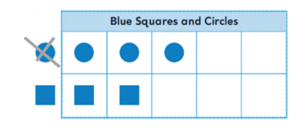
DIRECTIONS 9. Is this chart sorted by color, size, and shape? Choose Yes or No. 10. Choose all of the sets with the same number of objects.
Question 9.

Answer:
The square is red in color.
The circle is blue in color.
Explanation:
In the above-given question,
given that,
the shapes are circle and square.
The square is red in color.
The circle is blue in color.
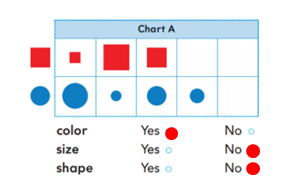
Question 10.

Answer:
The number of objects in all sets = 3.
Explanation:
In the above-given question,
given that,
there are 4 sets.
each set contains different objects.
so we have to choose 3 sets equal.
The number of objects in all sets = 3.
